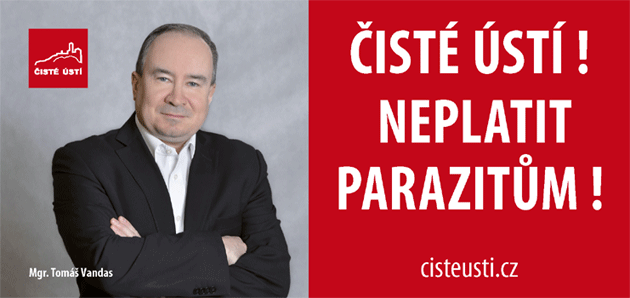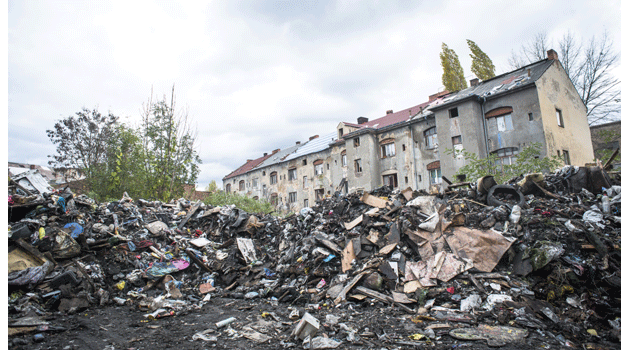Czech city declares its entire territory a ghetto for harsh housing benefit restrictions - which don't deliver

It’s no surprise. Even after the Czech city of Ústí nad Labem declared all of its territory a housing benefit-free zone in March, along with the neighboring community of Trmice, it continues to be a destination for what is being called “welfare tourism”.
Experts warned against the move because harsh restrictions on the disbursal of housing benefits applied across the board cannot work unless they are accompanied by social services programs. The numbers that news server HlídacíPes.org has now seen prove the experts right.
“If we have to, we will turn this city into a fortress. Ústí can no longer be a welfare tourism destination and we cannot allow speculators to continue to ruin the housing. For that reason, we’re going into this – housing benefits will not be disbursed anywhere on our territory. That’s not the only step we’re taking, others will follow,” the then-Vice Mayor Jiří Madar told the Mladá fronta DNES newspaper in May of 2018.
They did what they said they would. After the local elections last year, during which Madar’s UFO movement (Ústecké fórum občanů – Citizens’ Forum of Ústí) used the slogan “For a City without Parasites”, that movement joined a locally governing coalition with the victorious ANO (Association of Dissatisfied Citizens) party.
In March of this year the local government declared the city a zone where newcomers will not be entitled to housing benefits. Practically speaking, the City Council said the entire city is a ghetto where sociopathological phenomena exceed tolerable limits.
That was how the move to cut off housing benefits to newcomers was justified, and nothing like it has been done in any other Czech city with the exception of Kladno, where it was overturned after the Regional Authority intervened. The numbers are now confirming what experts warned about: Across-the-board restrictions on receiving housing benefits in and of themselves will not achieve the desired results.
Hundreds of new people
HlídacíPes.org has seen the numbers for the first eight months of this year with respect to Ústí’s municipal department of Neštěmice, the location of the Mojžíř housing estate which, according to many, is currently the worst ghetto in the country. Another locality with a similar reputation is Předlice, which is located in the central municipal department.
Between 1 January and 31 August 2019, 177 people moved into Neštěmice from the cities of Brno, Děčín, Havířov, Litoměřice and Rumburk. The actual number of newcomers, however, is much higher than the recorded number, because the “paper trail” does not include all their family members – not by a long shot.
In many cases these are big families heading for locations that are problematic, such as the Mojžíř housing estate. “The measures of a general nature about housing benefit-free zones have not fulfilled our expectations in the slightest,” says the Mayor of Neštěmice and local assembly member Yveta Tomková (Vaše Ústí – “Your Ústí”).
“In many problematic localities of the municipal department of Neštěmice, the measures were in place for a year and a half ahead of their being introduced across the board for the entire city. We ourselves had great expectations, but after a couple of months it was clear that they would not be met – on the contrary,” the mayor says.
“Problematic people continue to move in here irrespective of whether they are entitled to housing benefits or not,” she reports. Restricting housing benefits also did not “turn around” the cost of rents, which have remained stable.
However, what is crucial is that the housing benefits targeted by the measures are not being missed by the new arrivals, which means their lack is also not being felt by the “traffickers in poverty” who are profiting from these re-locations and rentals. “The housing benefit is the least valuable aspect of the entire welfare benefit system, usually it only amounts to a few hundred crowns, at the most CZK 1 000 or 2 000 [EUR 40 – 80],” the mayor explains.
“The rents have remained the same. Paradoxically, for example, it is exactly at Mojžíř that the cost of housing is the highest in the entire city, it’s not exceptional for people there to pay CZK 15 000 [EUR 600] a month,” the mayor says.
The influx of more “problematic people” is being felt by the Neštěmice council with respect to its regular operations. Among other matters, there now has to be much more garbage removal in the problematic localities because unauthorized dumping sites are being created there almost non-stop.
“In the morning our staff cleans the streets and takes the garbage away, and in the evening there’s more,” says Tomková, whose local authority is also constantly addressing complaints from the problematic locations. “Disruption of nighttime quiet, verbal assaults and public order violations are the most frequent misdemeanors.”
This should have been anticipated …
Experts predicted exactly these developments. “If a city decides to take advantage of such a measure, it should just be for a very small part of its territory or even just affect a specific building in order to create leverage over the owner, the trafficker in poverty,” Martin Šimáček, director of the Institute for Social Inclusion, told the Deník Referendum news server recently.
How is the leadership of Ústí nad Labem responding now that the measures have been in place for six months? It’s difficult to say – the Vice-Mayor in charge of social affairs, Tomáš Vlach (ANO), has yet to respond to questions from HlídacíPes.org.
His colleague on the local council, who is also an MP for the ANO movement, Eva Fialová, has confirmed the influx of new arrivals – herself included. “More and more people continue to move in, so soon it’s possible that the worst category will predominate here,” she said in an interview for the Aktuálně.cz news server assessing her four-month “social experiment” experience of living in an apartment in the ghetto in Předlice.
Šimáček claims the main responsibility for the situation rests with the state, which he believes must demonstrate to local authorities that it will not accept their driving out socially vulnerable people. “The crucial Labor Ministers usually go visit the mayors of North Bohemia, and during those one-off excursions to the excluded localities, they allow themselves to be easily convinced (or just confirm their own biases) that the solution is to change the welfare system and get rid of the ‘inadaptables’,” he posted to his blog on Aktuálně.cz.
The residents of the ghettos at Mojžíř and Předlice, of course, have their own stories to tell about politicians visiting. The ghetttos are among the obligatory stops made by Government buses – in September Czech Labor and Social Affairs Minister Jana Maláčová (Czech Social Democratic Party – ČSSD) even spent the night in Předlice.
Last year Prime Minister Andrej Babiš (ANO) dropped by there, and in 2016 it was Prime Minister Bohuslav Sobotka (ČSSD). “They come here like it’s the zoo, lots of ministers have come here. Nobody has come to our aid, though,” Mayor Tomková recently told the tabloid Blesk Zprávy.
What does the city have to say? “Representatives of the Government, the state and the political parties have always come to visit. Sometimes the visit proves important, sometimes less so. It would be pretty daring to say these visits are meaningless, though, because at least they see what it’s like here, and that experience is always important when they make their own decisions,” claims Romana Macová, spokesperson for the Ústí nad Labem City Hall.
Originally published on HlidaciPes.org.
